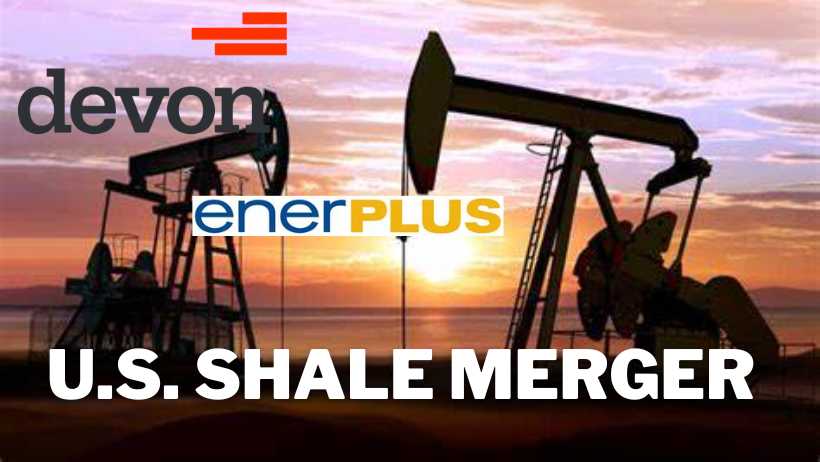Devon Energy and Enerplus consider a potential merger in the U.S. shale patch. Learn about the benefits, challenges, and market implications of this alliance.
Consider this: two energy sector behemoths, Devon Energy and Enerplus, are in intensive talks about a possible merger in the United States’ shale area. Devon Energy, which is looking to expand, sees enormous potential in Enerplus’ attractive land in the Bakken play, which would easily cover gaps in their portfolio. But that’s not all: Enerplus has non-operated land in the Marcellus, which might be a selling factor for Devon.
However, Devon’s history of acquisitions and poor stock performance has caused concerns among shareholders, resulting in unhappiness. When comparing this proposed merger to ExxonMobil’s merger with Pioneer Natural Resources, it is evident that strategic focus and shareholder value will be critical elements in determining the destiny of this collaboration. In this fast changing scenario, everything is possible, and the energy industry is holding its breath with expectation.
Background
Devon Energy and Enerplus, two major participants in the United States’ shale sector, have began talks about a prospective combination. This announcement has prompted widespread attention and conjecture in the energy business. The United States’ shale sector, famed for its massive oil and gas reserves, has drawn substantial investment in recent years, resulting in a highly competitive market.
Merger benefits include good acreage in the Bakken play.
One of the primary advantages of the proposed merger is Enerplus’s good land in the Bakken play. The Bakken deposit, especially in North Dakota and Montana, is known for its massive oil reserves. Devon Energy may improve its position in this profitable play by pooling its resources, resulting in increased oil output and income.
Filling holes on Devon’s land
Devon Energy presently holds significant land in many shale plays. However, there are certain holes in their portfolio that the acquisition of Enerplus may fill. Enerplus owns important property in locations where Devon has minimal presence. This transaction has the potential to offer Devon with a more diverse portfolio, enhancing their operational skills and financial performance. Understanding the Difference Between CDs and Treasury Bills
Possible sale of non-operated land in the Marcellus
In addition to addressing Devon’s acreage gaps, the possible merger might result in the sale of non-operated Marcellus properties. This strategic decision may enable Devon to streamline its portfolio and focus on key assets that are consistent with its long-term growth goal. The earnings from such a transaction might be reinvested in other productive companies, so increasing shareholder value.
Devon Energy’s Challenges.
Previous acquisitions
Devon Energy has encountered issues as a result of earlier acquisitions. Acquisitions may be a successful development strategy, but they can also cause integration and operational efficiency concerns. Devon’s ability to efficiently integrate acquired assets into its operations has been variable, resulting in poor profitability and shareholder unhappiness. Devon may learn from past failures and use those lessons to promote a better integration process.
Declining stock performance
Devon Energy has another issue in the shape of deteriorating stock performance. Despite the company’s solid fundamentals and rich assets, its stock has underperformed in recent years. This tendency has raised worries among shareholders, who are seeking methods to increase the value of their assets. The possible merger with Enerplus might serve as a stimulus for Devon’s stock performance, releasing synergies and establishing a stronger competitive position in the market.
Shareholder discontent
Devon Energy has faced shareholder displeasure owing to falling stock performance and unpredictable financial outcomes. Shareholders are looking for ways to boost the company’s overall performance and long-term prospects. Devon’s planned merger with Enerplus provides a chance to resolve these challenges and recover shareholder trust. Devon may seek to deliver greater value to its shareholders by capitalising on the synergies and possibilities created by the transaction. First Internet Bank – A Leading Online Bank with Competitive APYs
Comparison to the ExxonMobil merger
The similarities and variances in strategic emphasis
When comparing Devon Energy and Enerplus’s possible merger to ExxonMobil’s merger with Pioneer Natural Resources, several strategic similarities and contrasts arise. While both mergers seek to benefit on the prospects afforded by the United States’ shale region, their methodologies and agendas diverge.
ExxonMobil’s merger with Pioneer Natural Resources aimed to broaden their portfolio, mainly in the Permian Basin, and strengthen their position as a major producer. In contrast, the possible merger between Devon Energy and Enerplus is centered on filling gaps in Devon’s current acreage, notably in the Bakken play, as well as maximizing their assets.
Implications on shareholder value
Both transactions have potential ramifications for shareholder value. However, the impact on shareholder value varies depending on the merged firms’ strategic objectives, synergies, and financial performance.
Devon Energy and Enerplus see the proposed combination as an opportunity to generate synergies, boost operational efficiency, and strengthen their market position. If implemented correctly, these variables may result in greater shareholder value through improved financial performance and stock price appreciation.
Potential synergies
Improved operating efficiency.
Increased operational efficiency is a significant potential synergy in the Devon Energy-Enerplus combination. By pooling their technological experience, knowledge, and best practices, the combined business may simplify operations, decrease duplication, and improve processes. This greater efficiency can lead to cost savings, improved output, and higher profitability.
Cost reductions from pooled resources
The combination of Devon Energy and Enerplus also provides a potential for cost reductions via common resources. By merging its assets, infrastructure, and support operations, the combined firm may reduce redundancy and gain economies of scale. This, in turn, can result in lower operational expenses, higher profit margins, and a more competitive cost structure. Are Certificates of Deposit (CDs) FDIC insured and why it matters
Improved market position
Another possible synergy from the merger is an improved market position. Devon Energy and Enerplus’s combined resources and talents can help them compete more successfully in the United States’ shale sector. A stronger market position can lead to enhanced negotiation power, easier access to finance, and better capacity to handle market volatility.
Impact on the market and competitors
Consolidation in the US Shale Industry
The possible combination of Devon Energy and Enerplus has the potential to drive greater consolidation in the US shale industry. As businesses want to strengthen their positions, improve operational skills, and reduce costs, mergers and acquisitions become an appealing approach. This consolidation trend has the potential to redefine the competitive environment, change market dynamics, and impact investment patterns in the sector.
Reaction of other firms in the shale patch
The news of Devon Energy and Enerplus’ planned merger is expected to generate responses from other shale firms. Competitors may review their own strategic positioning, future collaborations or mergers, and the influence of consolidation on their operations. The reactions might range from greater competition to possible counter-offers, resulting in a dynamic and fast changing market situation.
Regulatory considerations
Antitrust implications:
Any possible merger in the energy business is scrutinized by regulatory entities, including antitrust regulators. Consolidation in the US shale area may generate worries about market concentration and monopolistic activities. Devon Energy and Enerplus will need to go through a rigorous assessment to verify they are in conformity with antitrust rules and have the required licenses.
The approval process for the merger
The Devon Energy and Enerplus merger clearance procedure will consist of many phases, including regulatory filings and evaluations. The firms will have to disclose detailed information on the merger’s impact on competition, market dynamics, and possible advantages to stakeholders. To improve openness and address stakeholder concerns, the approval process may include meetings with industry experts and public hearings.
Financial Analysis.
valuation of combined entity.
The accurate valuation of the merged firm is critical for assessing the possible financial effect of the Devon Energy and Enerplus merger. Financial analysts will consider asset valuations, revenue estimates, cost reductions, and synergies. The fair valuation will give insights into the merged entity’s value, allowing stakeholders to make educated judgments about the merger.
Projected financial performance
Projecting the financial performance of the amalgamated firm is an important part of the study. It entails conducting detailed scenario studies, taking into account various market circumstances, and calculating the impact of synergies and cost reductions. By analyzing the prospective financial results, stakeholders may determine the merger’s feasibility, projected returns, and overall benefit to Devon Energy and Enerplus. Rising Oil Costs: Geopolitical Tensions Rise as Israel Rejects Ceasefire Offer
Potential impact on shareholders.
Understanding the possible impact on shareholders is critical for evaluating the merger’s merits. Shareholders will be particularly interested in the merger’s estimated returns, stock price performance, and prospective dividends. A thorough and comprehensive financial study will give shareholders with the information they need to make educated judgments about the merger’s potential advantages and hazards.
Integration Challenges
Combining several company cultures.
Bringing diverse company cultures together is a fundamental problem in any merger. It is critical to handle possible conflicts, match company values and standards, and foster a collaborative work environment. The combination of Devon Energy and Enerplus will need good leadership, clear communication, and cultural integration methods to enable a seamless transition with little interruption.
Streamline operations and workforce.
Another major difficulty that occurs with a merger is the need to streamline processes and the staff. To minimize redundancies and improve efficiency, the combined company must analyze overlapping tasks, roles, and obligations. This approach involves careful planning, efficient change management, and open communication to guarantee that activities and staff are seamlessly integrated.
Addressing possible redundancy.
Mergers sometimes result in redundancies when the merged business evaluates its staff and organizational structure. Addressing redundancy tastefully and sympathetically is critical for minimizing the impact on employees and maintaining morale. Effective transition planning, redeployment possibilities, and open communication may all assist to ensure a seamless integration process and reduce any interruptions.
Conclusion
The possible combination of Devon Energy with Enerplus offers intriguing opportunities for both firms and their stakeholders. By resolving deficiencies in Devon’s assets, generating synergies, and improving operational efficiency, the amalgamated business has the potential to produce significant value in the US shale sector. However, the merger must be properly handled, taking into account regulatory concerns, financial analysis, and integration issues.
The value of shareholder approval cannot be emphasized. Shareholders must assess the merger’s potential advantages and dangers, financial ramifications, and strategic alignment with their investment goals. Their approval and support will be critical in deciding Devon Energy and Enerplus’s long-term viability.
Looking ahead, Devon Energy and Enerplus appear to have a good future. The possible combination offers opportunities for development, superior financial performance, stronger market position, and higher shareholder value. By using their strengths and synergies, the united firm can traverse the competitive terrain of the US shale patch and establish itself as a powerful competitor in the energy market.




